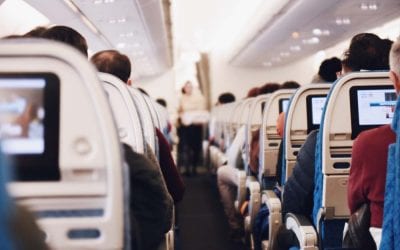The Senate version of the FAA Reauthorization Bill has now been released. Once more consumer issues have a far more prominent place than in previous bills. Step by step, Travelers United has been working on The Hill visiting with Senators and their staff to ensure that the consumer voice is heard.
Now, that the initial bill has been announced together with the initial House version, consumers have a cleared picture of what the aviation legislative landscape will look like for the coming six years. It is not bad for consumers, but there are three major areas where Congress can come through on the side of consumers and where issues included in the Senate and House version can be combined to help passengers.
1. Passengers need a ruling from the FAA defining adequate personal space on aircraft.
Without a limitation on how closely airlines are allowed to pack passengers into planes based on personal space, health and safety, airlines have no governor on their seating systems.
The only factor that needs to be considered today is whether or not the plane can be evacuated within 90 seconds in case of a crash. Even that factor is being stretched by the airlines after aircraft have been certified. The Advisory Committee for Aviation Consumer Protections learned that no current aircraft have been certified with seats packed as closely as they are in many of today’s aircraft. As a matter of safety, these tests should be completed immediately.
Senator Blumenthal and Schumer have introduced a bill that would ask the FAA to conduct a study to define humane personal space and to require testing of aircraft with today’s seating configurations.
2. Fees should be commensurate with the costs of airlines that provide the service.
The poster child for this issue is the change/cancellation fee charged by most airlines. When a $200 change fee is charged to change only the outbound leg of a ticket that initially may have cost $180, something smells rotten. These change fees appear to be totally arbitrary and widely excessive.
Sen. Markey and Sen. Blumenthal introduced a bill that should be added to the FAA bill requiring airlines to justify their fees with a cost analysis.
In an effort to protect consumers from these rising fees, Senators Edward J. Markey (D-Mass.) and Richard Blumenthal (D-Conn.) today introduced the Forbidding Airlines from Imposing Ridiculous (FAIR) Fees Act, legislation that prohibits airlines from imposing fees, including cancellation, change and bag fees, that are not reasonable and proportional to the costs of the serves provided. The legislation also directs the Department of Transportation to review any other fees charged by airlines. In 2015, American Airlines, Delta, and United cumulatively earned approximately $19.4 billion in profits. Through the first three quarters of 2015, airlines collected more than $5 billion in bag fees and change/cancellation fees.
…
Under the FAIR Fees Act, for bag fees, airlines will only be authorized to charge fees that cover the costs of the baggage handlers, ticket agents, the baggage processing or anything that reasonably pertains to checking a bag. For example, American Airlines, Delta, and United charge more money for the second checked bag than the first, yet there appears to be no appreciable cost increase for processing the second bag. For change/cancellation fees, airlines will be authorized to charge fees that cover the cost of processing the new tickets and any potential loss of revenue due to the cancellation, noting that any loss of revenue may be minimal or even zero because the airline can resell the seat for a potentially higher fare.
3. The future of drones over America
Here, Travelers United is asking for the creating of an Unmanned Aerial System Future Advisory Board that would be tasked with exploring the future of this technology’s use in America. These unmanned aerial systems (UAS) will soon form a third layer of transportation that will become part of our country’s infrastructure. These UAS will be used for everything from delivering packages and assisting fire departments to inspecting power lines and helping with agriculture. Flying cars, just like in the Jetsons, are less than a decade away.
Unfortunately, the US has no rules for this new world.
Today, the US has no forward-looking plan for integrating this rapidly growing technology into our airspace system. Commercial interests have dominated the short range planning, which has been helpful. However, the country needs to take a look further into the future — out 20 or 30 years — to begin establishing systems to provide proper registration, rulemaking and enforcement at state and local levels. A federal administration overseeing all drone operations is a recipe for disaster and is unworkable.
A look into the future by a panel of aviation stakeholders, academics and futurists will begin to provide a picture of what might be developed in the future and how the US can cope with this new layer of transportation. This issue has been discussed with Commerce Committee staffers and one Senator has already drawn up legislative language that, hopefully, will be added to the final bill’s language.
Next: I will discuss blending the consumer protections from the Senate version of the FAA bill with those of the House version.

Charlie Leocha is the President of Travelers United. He has been working in Washington, DC, for the past 14 years with Congress, the Department of Transportation, and industry stakeholders on travel issues. He was the first consumer representative to the Advisory Committee for Aviation Consumer Protections appointed by the Secretary of Transportation from 2012 through 2018.



